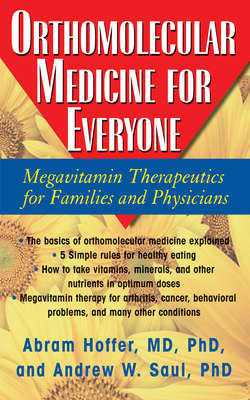Читать книгу Orthomolecular Medicine for Everyone - Abram Hoffer M.D. Ph.D. - Страница 15
На сайте Литреса книга снята с продажи.
NUTRITION AND THE BODY’S DEFENSES
ОглавлениеNo one can doubt that a healthy person can withstand insults better than one who is less healthy. The natural defenses of our bodies must be maintained at their optimum efficiency. When this is the condition, it is likely that many of the diseases will not even occur—the arthritidies will not come, there will be a much smaller probability of developing diabetes, and invasions by bacteria and viruses will have less chance of becoming established.
There are really two issues. The first is whether malnutrition decreases the body’s immune defenses below what they would normally be. The evidence for this is conclusive: any form of malnutrition, from protein and calorie deprivation to any vitamin or mineral deficiency, increases the likelihood of developing infections and of not healing as fast after trauma, surgery, or burns. These forms of malnutrition ought to be treated vigorously.
The second issue is whether improved nutrition, as is recommended by orthomolecular nutritionists, increases the body’s defenses above what they commonly are. About this issue, there are two divergent camps. We believe that enhanced nutritional health will increase defenses to the point that the incidence of a large number of diseases is decreased, and if disease is already present, then healing is accelerated. However, the majority of physicians do not believe that enhanced nutrition is necessary, for they believe that most people are already nutritionally healthy. The arguments in favor of nutritional enhancement arise from observations made by many physicians. As will be discussed in this book, a number of conditions respond to orthomolecular treatment. The fact of this improvement leads to the conclusion that the body’s defenses are revitalized. If vitamin B3 improves arthritis, then increasing vitamin B3 intake should prevent arthritis. Enhancing nutritional states from very poor conditions thus improves defenses.
A lead story in The Medical Post on March 4, 1986, reads: “Malnutrition, rampant among surgical orthopedic patients, is greatly increasing the number and severity of complications suffered by these people.” Studies of orthopedic populations in university and private hospitals have shown patient malnutrition of 42 percent and 68 percent, respectively. In one study, 85 percent of Symes amputations performed on malnourished patients failed, compared to 86 percent success among properly nourished patients. The report in The Medical Post concludes: “General surgeons have long known that the morbidity and mortality associated with operations on malnourished patients is markedly elevated…. Yet very few references concerning the importance of nutrition appear in the orthopedic literature. This study has shown that malnutrition is much more common among surgical patients than most people believe.” Other supporting observations arise from experiments in which nutritional supplements have been used in animals and humans to test immune defenses.
